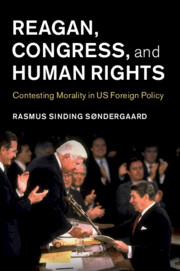Book contents
- Reagan, Congress, and Human Rights
- Human Rights in History
- Reagan, Congress, and Human Rights
- Copyright page
- Contents
- Figures
- Acknowledgments
- Abbreviations
- Introduction
- 1 After the Breakthrough
- 2 The Reagan Turnaround on Human Rights
- 3 The Congressional Human Rights Caucus and the Limits of Bipartisanship
- 4 The Right to Leave
- 5 “A Universal Human Rights Issue”
- 6 Two Tales of Human Rights
- Conclusion
- Bibliography
- Index
6 - Two Tales of Human Rights
US Policy toward Nicaragua
Published online by Cambridge University Press: 27 March 2020
- Reagan, Congress, and Human Rights
- Human Rights in History
- Reagan, Congress, and Human Rights
- Copyright page
- Contents
- Figures
- Acknowledgments
- Abbreviations
- Introduction
- 1 After the Breakthrough
- 2 The Reagan Turnaround on Human Rights
- 3 The Congressional Human Rights Caucus and the Limits of Bipartisanship
- 4 The Right to Leave
- 5 “A Universal Human Rights Issue”
- 6 Two Tales of Human Rights
- Conclusion
- Bibliography
- Index
Summary
The establishment of the leftist Sandinista government in Nicaragua following the overthrow of the US-friendly Somoza regime in 1979 caused considerable alarm in the United States. Chapter 6 analyzes the role of human rights concerns in the battle between the Reagan administration and members of Congress over US policy toward Nicaragua in the 1980s. Fearful of Nicaragua turning into a communist stronghold in Central America, the administration conducted covert operations against the Sandinistas and supported the anti-Sandinista guerillas know as the Contras. Once these activities were revealed, the administration found itself engulfed in a public diplomacy war for congressional and public support. The chapter examines congressional attempts, predominantly by liberal Democrats, to restrict US aid for the Contras through the imposition of the so-called Boland Amendments. Ultimately, restrictions led the administration to undertake illegal actions that resulted in the Iran-Contra Affair. The chapter demonstrates how both the administration and its congressional critics invoked human rights to claim moral authority for their positions on Nicaragua. It argues that the debate over Nicaragua both raised the salience of human rights concerns in the United States and highlighted their ambiguity as it underscored the selectiveness of the administration’s commitment to human rights.
Keywords
- Type
- Chapter
- Information
- Reagan, Congress, and Human RightsContesting Morality in US Foreign Policy, pp. 215 - 260Publisher: Cambridge University PressPrint publication year: 2020

